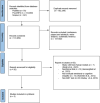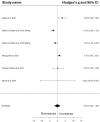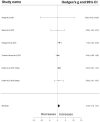Effects of classical psychedelics on implicit and explicit emotional empathy and cognitive empathy: a meta-analysis of MET task
- PMID: 39424835
- PMCID: PMC11489570
- DOI: 10.1038/s41598-024-74810-w
Effects of classical psychedelics on implicit and explicit emotional empathy and cognitive empathy: a meta-analysis of MET task
Abstract
This meta-analysis investigates the effect of classic psychedelic drugs on empathy and focuses on cognitive and emotional empathy measured using the Multifaceted Empathy Test (MET). Empathy entails the ability to understand and share the feelings of another and is a significant component of social interaction. Several studies have examined the effects of psychedelic drugs such as LSD, psilocybin and ayahuasca on empathy, yet their overall effect has not been studied so far. In this meta-analysis, we reviewed data from studies up to November 2023 with the aim of examining the effects of various psychedelic drugs on empathic abilities broadly. Our findings suggest that classical psychedelics significantly enhance explicit and implicit emotional empathy without affecting measures of cognitive empathy. The results emphasize the need to continue testing the therapeutic potential of classic psychedelic drugs.
© 2024. The Author(s).
Conflict of interest statement
The authors declare no competing interests.
Figures











Similar articles
-
Illicit use of LSD or psilocybin, but not MDMA or nonpsychedelic drugs, is associated with mystical experiences in a dose-dependent manner.J Psychoactive Drugs. 2012 Nov-Dec;44(5):410-7. doi: 10.1080/02791072.2012.736842. J Psychoactive Drugs. 2012. PMID: 23457892
-
Psychedelic-assisted therapy for treating anxiety, depression, and existential distress in people with life-threatening diseases.Cochrane Database Syst Rev. 2024 Sep 12;9(9):CD015383. doi: 10.1002/14651858.CD015383.pub2. Cochrane Database Syst Rev. 2024. PMID: 39260823
-
Assessing the effects of methodological differences on outcomes in the use of psychedelics in the treatment of anxiety and depressive disorders: A systematic review and meta-analysis.J Psychopharmacol. 2022 Jan;36(1):20-30. doi: 10.1177/02698811211044688. Epub 2021 Sep 14. J Psychopharmacol. 2022. PMID: 34519567
-
Present and future of metabolic and metabolomics studies focused on classical psychedelics in humans.Biomed Pharmacother. 2023 Dec 31;169:115775. doi: 10.1016/j.biopha.2023.115775. Epub 2023 Nov 7. Biomed Pharmacother. 2023. PMID: 37944438 Review.
-
A Brief Historical Overview of Psychedelic Research.Biol Psychiatry Cogn Neurosci Neuroimaging. 2024 May;9(5):464-471. doi: 10.1016/j.bpsc.2023.11.003. Epub 2023 Nov 23. Biol Psychiatry Cogn Neurosci Neuroimaging. 2024. PMID: 38000715 Review.
References
-
- de Vignemont, F. & Singer, T. The empathic brain: how, when and why? Trends Cogn. Sci.10(10), 435–441. 10.1016/j.tics.2006.08.008 (2006). - PubMed
-
- Quesque, F. & Rossetti, Y. What do theory-of-mind tasks actually measure? Theory and practice. Perspect. Psychol. Sci.15(2), 384–396. 10.1177/1745691619896607 (2020). - PubMed
-
- VandenBos, G. R. (ed) APA Dictionary of Psychology (American Psychological Association, 2007).
-
- Shamay-Tsoory, S. G. The neural bases for Empathy. Neuroscientist. 17(1), 18–24. 10.1177/1073858410379268 (2011). - PubMed
-
- Goodhew, S. C. & Edwards, M. The relationship between cognitive failures and empathy. Pers. Indiv. Differ.186, 111384. 10.1016/j.paid.2021.111384 (2022).
Publication types
MeSH terms
Substances
LinkOut - more resources
Full Text Sources
Miscellaneous


